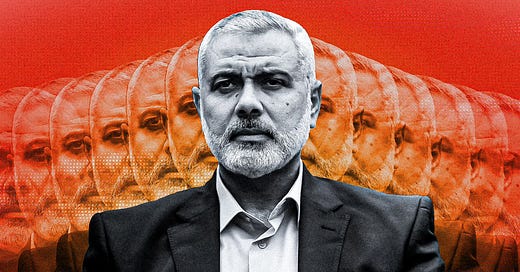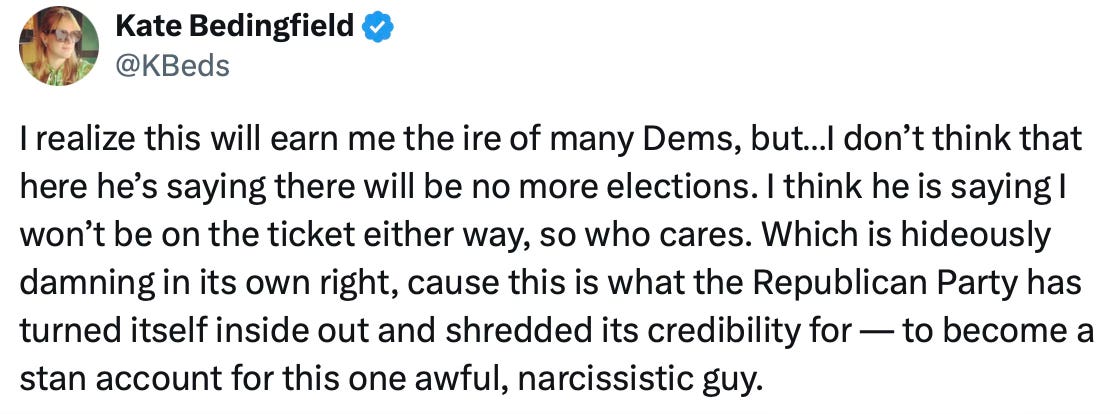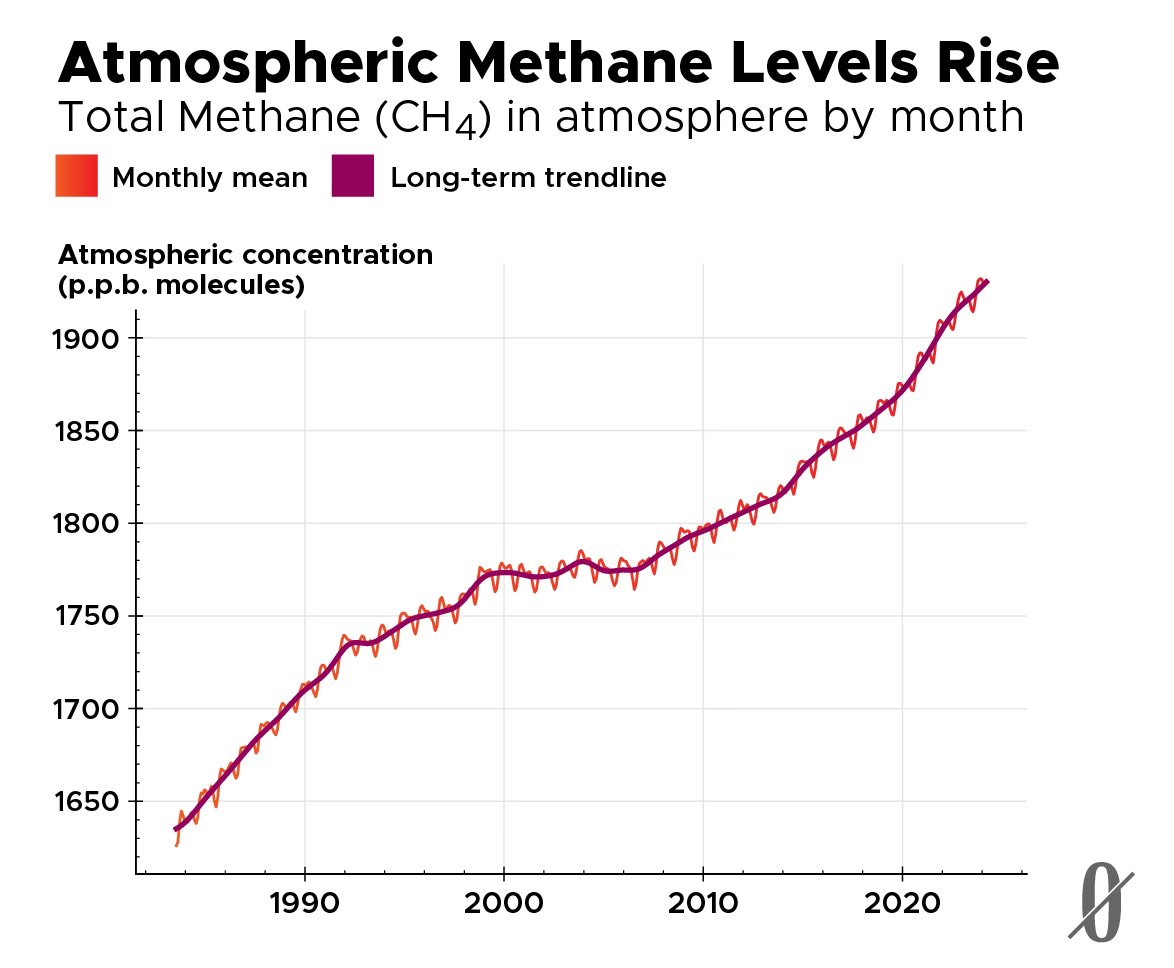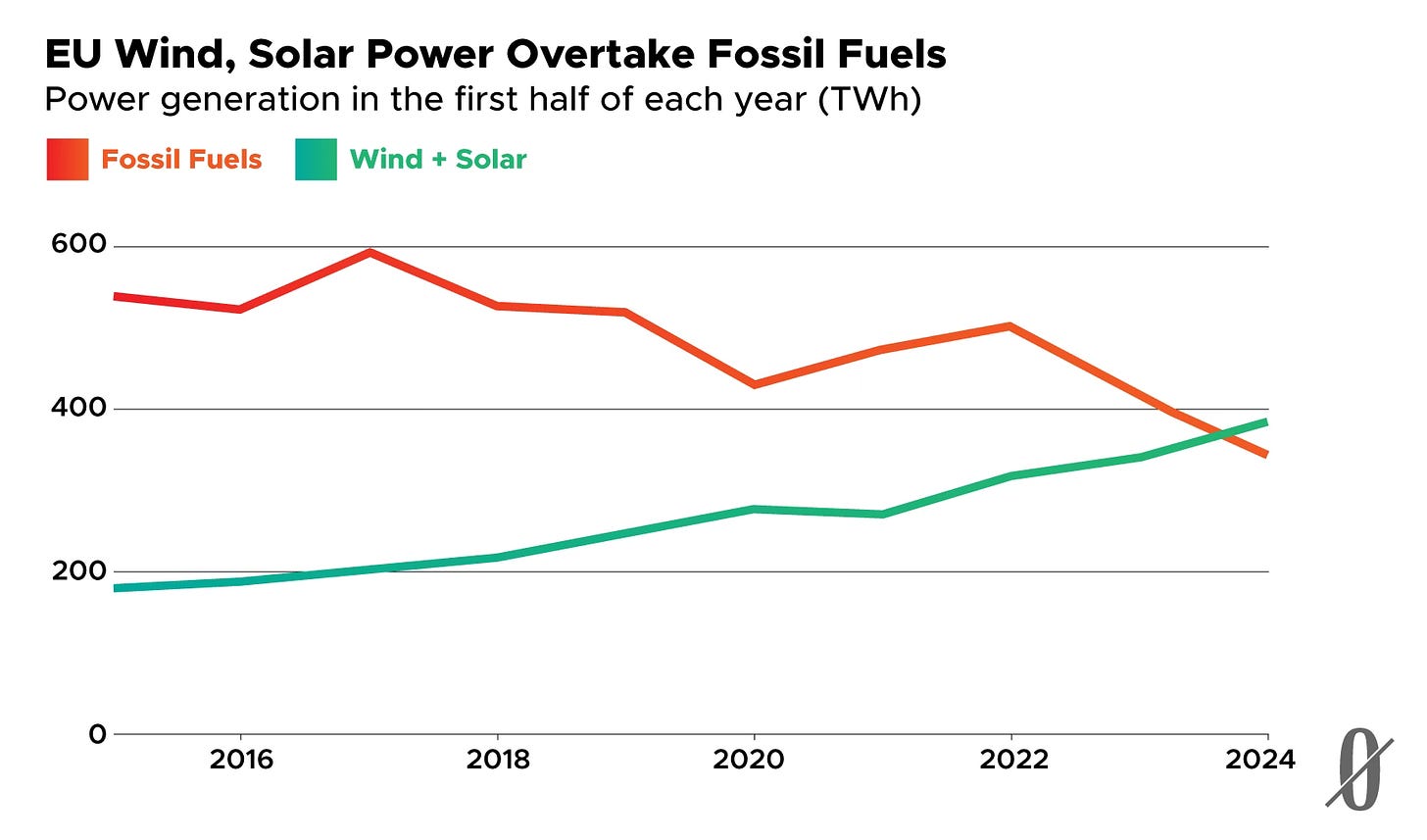The Haniyeh Assassination Will Haunt Israel
Plus: Zoom with Bob, Trump Rorschach Test, methane doom loop, Biden backs controversial AIs, sanctions fail again, threat inflation wins again, and more!
Reminder: I’m hosting a Zoom call with NZN members next Wednesday August 7 at 8 pm US Eastern time. The main topic will be foreign policy, but all questions (OK, most questions) will be welcome. NZN members will find a link for the Zoom room at the bottom of this email. If you’re not already an NZN member, you can remedy that by clicking here. — RW
Israel’s assassination on Wednesday of Hamas leader Ismail Haniyeh triggered yet another round of fears that the Gaza War will expand into a regional conflagration.
These fears aren’t without foundation. By killing Haniyeh on Iranian soil—arguably an act of war and certainly an “embarrassment” for Tehran, as many noted—Israel guaranteed a violent and substantial response from Iran. Still, worries about a wider war are obscuring the longer term, and equally scary, implications of Israel’s attack.
With the assassination of Haniyeh, Israeli Prime Minister Benjamin Netanyahu has, in one fell swoop, weakened forces of moderation within both Iran and Hamas. This is good short-term politics for Netanyahu, who will likely stay in office as long as his country stays at war. But it could be bad news for Israel, and the world, in the long run.
Netanyahu likes to depict his country’s enemies as implacably hostile, eternally bent on Israel’s elimination. But this picture glosses over the multifaceted motivations and messy internal politics of Iran, Hamas, and other antagonists of Israel.
Ismail Haniyeh embodied this more complex reality as it played out within Hamas. Many in the West share Netanyahu’s view of Hamas as a monolithic organization that’s determined to destroy Israel, but most experts acknowledge that there are divides within the group over the virtues of permanent armed struggle. And Haniyeh has for years acted as a relatively moderate mediator between Hamas’s dueling camps on this issue.
Israel’s backers sometimes balk at this characterization, and they have ample examples of harsh rhetoric from Haniyeh that they can cite. But that’s what made him unique among Hamas bigwigs: Haniyeh’s mix of tough talk and political pragmatism gave him legitimacy among moderates and hardliners alike.
Haniyeh was an early advocate of the group’s participation in electoral politics and was poised to become the Palestinian prime minister in 2007 before a civil war between Hamas and Fatah prevented him from taking office. (As NZN explained in November, the Bush administration fomented this civil war for the purpose of negating the result of Palestinian elections that Bush himself had encouraged.)
After the civil war, Haniyeh became, in effect, governor of Gaza, and in 2017 he took over the political leadership of Hamas from Khalid Mishal (whose moderate overtures back in 2007, when he embraced the Oslo accords and negotiations toward a two-state solution, had been effectively squelched by the Bush administration). Haniyeh moved abroad to fulfill his new role as Hamas’s de facto chief diplomat.
It was in this position that Haniyeh became one of Palestine’s leading political figures, both within his home country and across the Arab world. Polls indicate that, at some points over the past year, he would have won Palestinian presidential elections decisively.
Distance has its disadvantages. It’s unclear how much Haniyeh, ensconced in Qatar, knew about plans for the Oct. 7 attack on Israel, according to Reuters; most of the planning occurred in secret meetings of Hamas hardliners within Gaza. But in the months after the attack, Haniyeh and Mishal led efforts to end the Gaza war and resolve intra-Palestinian divisions. Haniyeh offered in November to pursue a two-state solution if Israel agreed to a ceasefire.
“He was not just a diplomat but a moderate, someone willing to consider that reconciliation and diplomacy with Israel was the right route to take,” Tahani Mustafa of the International Crisis group told the Guardian. “The more you assassinate or get rid of moderates, the more that hardliners come to the fore, or you convert moderates into hardliners.”
In other words, Haniyeh’s assassination hasn’t just hurt chances for a near-term ceasefire; it’s also given Palestinian hardliners like Yahya Sinwar, Hamas’s leader in Gaza, an argument against seeking a political solution to the broader conflict. And it’s left moderates like Mishal without an effective ally to make the opposite case.
As it happens, Haniyeh, at the time of his death, was in Tehran to mark a moment when Iran’s politics seemed newly amenable to moderation. He was there to meet with Iranian President Masoud Pezeshkian, who won recent elections on a platform of rekindling talks with the US and its allies.
Haniyeh’s death leaves the moderate Pezeshkian in “an extremely difficult situation,” according to Muhammad Sahimi of the University of Southern California. “If Iran does nothing, it will be mocked throughout the region,” Sahimi wrote in Responsible Statecraft. Such inaction, Sahimi notes, would also weaken the president’s hand against Iranian hardliners (who oppose, among other things, normalized relations with the US). But a strong reaction—like a direct attack on Israel—could undermine hopes for detente between Iran and the West. Either way, Iranian moderates lose. And, either way, it’s that much harder to imagine a day when Israel and Iran have worked out a modus vivendi.
So Israel’s killing of Haniyeh, by undermining moderates in both Hamas and the Iranian government, would seem to have set back hopes of resolving the two conflicts that most threaten Israel’s security: the conflict with the Palestinians and the conflict with Iran.
This week, after Israel assassinated not just Haniyeh in Tehran, but a high-ranking Hezbollah commander in Beirut, Washington Post columnist David Ignatius noted the contrast between Israel’s mindset and the mindset of the various Arab states that want to stabilize the Middle East by ending the Israel-Palestine conflict and resolving their own tensions with Iran.
“The Israelis are still stuck in a zero-sum game” in the Middle East, Ignatius wrote. While much of the region is ready for a broad detente, Israel still sees itself as a lonely brawler in a brutal neighborhood. “But Israelis should ask themselves how well the hard-nosed, forever-war approach has worked in practice.”
Here’s a slightly different way of framing it:
The relationship between Israel and its enemies is in reality non-zero-sum. Enduring peace between Israel and Iran would be good for both nations, and a just two-state solution (or a just one-state solution) would be good for Palestinians and Israelis broadly. But depicting these relationships as purely zero-sum brings political benefits to Bibi Netanyahu.
By the same token, hardliners in Iran and Hamas benefit from depicting the relationship with Israel in zero-sum terms. And, just as their belligerence helps Netanyahu with his zero-sum framing, his belligerence helps them with theirs. The one non-zero-sum game that all these political actors seem eager to play is the one they play with each other.
Kate Bedingfield, Joe Biden’s former comms director, took some of her fellow liberals to task for their reaction to a recent speech in which Donald Trump told Christian supporters they “won’t have to vote anymore” after this year’s election.
Many on the left (including Kamala Harris’s campaign and multiple Democratic lawmakers) interpreted Trump’s comment as a vow to end American democracy. But Bedingfield saw things differently:
Bedingfield was right about how “Dems” would respond to her tweet. Here’s a viral dunk from Rachel Vindman, wife of #resistance hero Alexander Vindman: “Minimize his statements at your own peril. My family doesn’t have that luxury, Kate. Our safety and freedom are on the line.”
It’s possible that neither Bedingfield nor Vindman is right about what Trump meant. Arguably, he was just saying Christians won’t have to vote anymore because the problems they most care about will be “fixed” after he’s reelected. Republican politicians said he was joking along those lines.
Political scientist Erica De Bruin, speaking to the Washington Post, noted that “Trump frequently makes these kinds of deliberately ambiguous statements that can be interpreted in multiple ways.”
NZN readers, you tell us: Was Trump 1) vowing to end democracy, 2) saying that this will be the last election featuring him, 3) saying that he’ll solve the big problems Christians care about, or 4) more than one of the above (i.e. being deliberately ambiguous)?
Methane emissions have had a resurgence over the past two decades that could complicate the fight against global warming, according to a new study by an international team of more than a dozen scientists. The rise began in the mid-aughts, and by the 2010s emissions exhibited growth rates not seen since the 1980s.
The reasons behind the resurgence aren’t entirely understood. Increased emissions from fossil fuels and livestock are a known factor. Another is a kind of climate doom loop: As the planet warms, organic matter in wetlands decomposes more rapidly, releasing methane that in turn accelerates the warming… and so on.
Methane doesn’t stay in the atmosphere as long as many other greenhouse gasses, but it does a lot while it’s there. In the first two decades after entering the atmosphere, it has more than 80 times the warming power of carbon dioxide (per unit of mass). Between 1850 and 2019, methane emissions accounted for two thirds as much warming as CO2 emissions accounted for.
Meanwhile, some positive environmental news: For the first time, the European Union is getting more of its electricity from wind and solar than from fossil fuels, according to a new report from climate think tank Ember. In the first half of 2024, wind turbines and solar panels generated 30 percent of the EU’s electricity, compared to 27 percent generated by burning coal, oil, and gas.
This week Americans got an all-points bulletin notifying them that their military is woefully unprepared for a major war. That was the conclusion of a bipartisan congressional report, and outlets ranging from Foreign Policy and Business Insider to the Economist and Newsweek presented it in dramatic fashion, highlighting risks said to be posed by various adversaries. (Newsweek’s headline: “China Has Wiped Out US Military Advantage in Western Pacific: Commission.”)
But this coverage left readers with only part of the story. Notably missing were two important pieces of background information about the report, which hawks are already using to push for a big boost in military spending.










